TR Interview: The Robot Chicken Writers
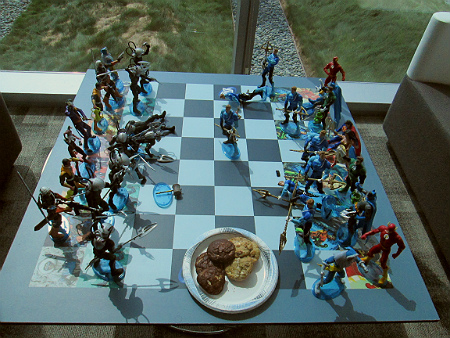 |
DC Comics’ new headquarters in Burbank is filled with things to look at, from the movie costumes in the lobby to the giant superhero drawings on every sliding office door. In-house toys adorn most desks, and the vault room that contains as many early issues as the company has been able to gather has glass walls, so you can look, even if you’d never remotely have the security clearance to touch.
But I’m not here merely to geek out. Robot Chicken has a new DC Comics Special airing Sunday, and I’m here to meet the writers, whom I talked to in two groups of three.
Eric Towner, Kevin Shinick and John Harvatine
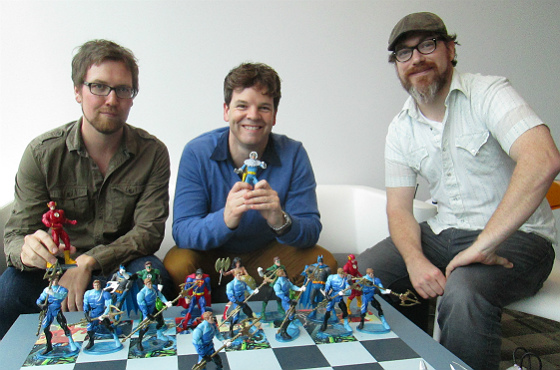 |
Luke Y. Thompson: Is it your choice, or is it a constraint that you tend to focus mostly on the Silver Age? Is there any rule, like you can’t touch the New 52?
Kevin Shinick: No, not at all. In fact, it wasn’t even that. I know Seth [Green] really wanted to focus, in the first special, on the Super Friends cartoon, even, so we could utilize the Hall of Justice and the Legion of Doom. So I think that was our starting point. But then, anything was game. Everything was open season at that point. We could go to any realm we wanted to. It may have just been haphazard. Good for noting, though.
LYT: Was the Silver Age the comics you grew up with?
KS: For me it was. Yeah, yeah.
John Harvatine: I don’t even know what the Silver Age was, I’m serious!
Eric Towner: [laughs]
JH: Can you tell me what that is really quick?
KS: What’s the actual years? There was the Golden Age and the Silver Age.
LYT: I don’t know. I just know that there was a point where I stopped reading comics and then I came back, and suddenly Superman and Batman weren’t friends any more.
KS: You can come any different week and find that out! To answer your question, no, we didn’t focus on that. But I think we’re all in the same – around the same age, so I think we all grew up reading the same time period of comics.
LYT: Do you ever come up with gags that involve a toy that you can’t get, like say the Mego Batman with removable cowl? You want to write something for him, but it just breaks the budget to try to find?
KS: You know, we have a really good staff of people who search and search for these things. This is not the DC Comics special, but I remember in the regular season, we were doing a Six Million Dollar Man sketch. And they didn’t make one – he had to have both eyes, and he only had one eye, because you could see through it, and then it dawned on me: What about Maskatron? Which was a villain of his in the TV show, they made a doll of, where he had different masks, and one was Steve Austin.
ET: That’s impressive!
KS: See? I whipped that out!
ET: Kevin, two for two!
KS: [laughs]We found that. So it’s kind of fun to try. At this point, in season six going to season seven, a lot of times we’ve learned that it’s easier sometimes to start from scratch and make a malleable puppet. But a lot of times, if there’s something out there that we can use, we will do that first.
LYT: I was wondering that, because you have Chemo, who was obviously the build-a-figure, in this one…
KS: If things exist, we try first to get that. Unless of course it’s going to be restrictive of the action, the movement we want it to do for the comedy.
LYT: Do you build them from scratch when they’re super-poseable, or do you take an actual one and customize it, give it new arms?
ET: It’s about half and half. We’ll either take existing toys and just modify them to be animated. And then a lot of the times it’ll be a scratch build, made to look like a certain toy, because we need it to do a certain action that the toy could just never do. But there is something kind of charming and funny about Robot Chicken when it is just – you’re using these little dumb toys, and you can tell that they’re the actual toys, with all of their glorious limitations.
JH: I think an example – did you see one of those characters, that green guy – is that Chemo?
KS: Chemo, yeah.
JH: So that was just a toy. He really doesn’t do much. He’s just kind of like that, which is more funny than if we were to build something up, spend a lot of time and money on it, make it do all these things. It’s funny watching him do that, you know?
LYT: Did you all get any ideas watching The Lego Movie of how the simple movements can go a long way?
KS: I think they found their inspiration from close to home. [chuckles]Weren’t you guys involved in the end credits?
ET: Yeah, we did…
JH: Yeah, our studio was.
KS: Nice plug!
ET: Yeah, our studio – Stoopid Buddy Studios – we did the, we collaborated on the titles and end credits of the movies of The Lego Movie. One of the co-directors of The Lego Movie, Chris McKay, got his start on Robot Chicken.
KS: Right. He’s directing the next Lego Movie.
LYT: Yeah.
ET: There’s a lot of our blood there.
LYT: Do you know if the ones they have at Legoland are the actual end credits that were used in the movie?
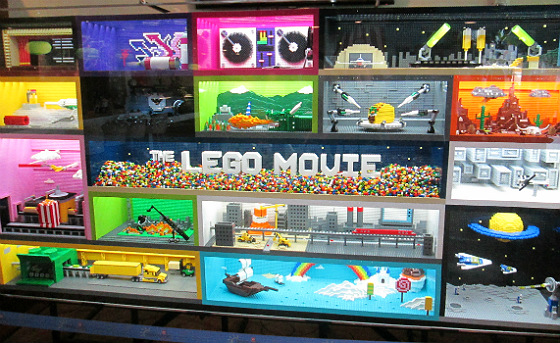 |
ET: Those are them, yeah. We had them in a studio, then shipped them off to Legoland for kids to enjoy.
KS: Exactly.
LYT: From a writing standpoint, is it more fun to do a special like this, that has more of a through story line? Is that a relief, because you don’t have to come up with as many different skit ideas with different characters?
ET: Sometimes more difficult, because we set out to do that. Sometimes the sketches will dictate where we think the story will lead. Other times, it’s the other way around. In this case, I think we said, “All right, wouldn’t it be funny if this happened, and Lex Luthor had to go find his daughter down at a beach house?” But we’re all generating all of these sketches just to be funny. So a lot of times, a week in, we’re like, “Guys, we’ve got a lot of funny sketches, but nothing is supporting the story that we talked about!” [laughter from all]
So we’ll try and focus a little bit more. I find it sometimes a little more difficult to write – not difficult to write the linear story, but when you’re just coming up with funny, it’s always easier to be like, “I’m going to pull this out of left field and do this,” and if it also helps the story, then great.
LYT: I also noticed the Bizarro skit early on really sets up something that casual readers may have forgotten, which is that he says the opposite of what he means.
ET: Right, exactly.
LYT: Was that conscious, or was that just, “I want to write a random Bizarro skit”?
ET: You know, I think the sketch came randomly, but then in constructing the episode, like you said – audiences need a little reminder, so we said, “Let’s start with this, so that at the end we can…”
JH: Ah, smart!
ET: Mm-hmm! It’s called a call back.
LYT: Content-wise, is there anything Adult Swim won’t let you do?
ET: Go home early. [all laugh]No, they really – DC too – both companies have been really generous with where we can go and what we’ve done. I’m sure there may be one or two instances where they wanted to tone something down or something, but for the most part, they’ve been like, “Free rein – do whatever you want to do.”
LYT: I was thinking of the dick with a smooth head line [a double-entendre referring to Lex Luthor].
ET: Yeah, I wrote that. I wrote the Grease parody song, and I wrote that in, and I said I don’t hold back when I’m writing. Let’s see if we can get it through, and it got through. So that’s why I never censor myself to begin with.
LYT: No problem on that one. [laughter]The Fangorn Forest reference [to unshaven pubic hair]– is that something you’ve heard someone actually say, or did that come out of one of your minds?
ET: I think – I can’t remember. I can’t remember who wrote that. And if they are plagiarizing, we’ll get to the bottom of this, if this is someone else’s. But it may have just come up in the room.
LYT: So I heard someone say there are Dino Riders jokes coming up in the next season.
JH: Yeah, we just saw some of the animation from the Dino Riders sketch. It’s brilliant.
LYT: Were those hard toys to come by, or did you build them from scratch?
ET: Those were the actual toys, right?
JH: Those were the toys, yeah. I don’t know if they’re hard to come by. They probably just searched the aisles of eBay, but they’re really funny. They’re just the straight-up toys, bouncing on the dinosaurs. It’s a really funny sketch.
LYT: Is it a different dynamic having DC out here in Burbank versus New York? Does that change anything?
ET: Well, I’m happy they’re out here, because we got to write the special here. I’ve also worked with DC in New York. It’s mostly editorial there, or was. I don’t think it matters, really. For me as a reader and a writer, it doesn’t, but I’m sure it affects a lot of other people’s lives!
LYT: When you work this closely with DC, do you try to say, “Hey, can we get a look at the Batfleck costume?”
ET: Constantly! And they constantly say “No!”
JH: It never works.
ET: [laughs]They’re very good to us, and there’s a big archive room, there’s a big merchandise room, and we always get to skip through there possibly once or twice, but they keep their secrets pretty much under wrap. As much as we’ve begged Geoff to tell us secrets that we’d see in these upcoming movies, he would not crack.
LYT: They give you a pretty free reign content-wise to do whatever you want with the characters, but would they ever say something like, “That character doesn’t have that superpower. You’re doing it wrong.”?
ET: Absolutely, absolutely. I wrote a Deadman sketch that I wrote in the first special, where it was a fine line whether that was actually his power or not, but it was a funny scenario, so we at least animated it, or did the animatic for it, but because Geoff’s there, and because a lot of us know these characters, we could be like, “OK, that’s funny, but he doesn’t do that.” It’s like if you made Aquaman fly, or did something – it’s not as funny, you have to stick to who these people are.
Tom Root, Zeb Wells and Douglas Goldstein
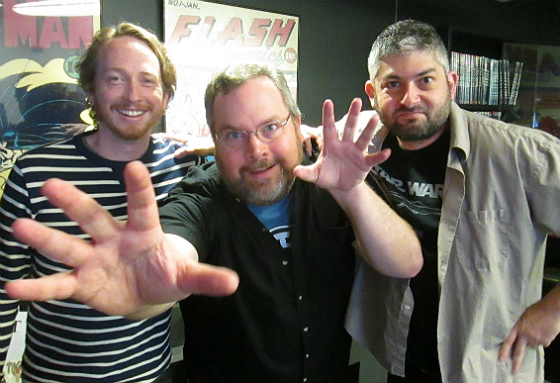 |
Luke Y. Thompson: You mentioned Wizard Magazine. How much of Robot Chicken came out of Twisted Mego Theater?
Tom Root : Are you a lawyer? [everyone laughs]
Zeb Wells : Who’s asking?
LYT: Inspirationally – I don’t mean…
Douglas Goldstein: A lot of us on staff, Tom especially, wrote what you saw of Twisted Mego Theater, up until the point where we left. So certainly the same sensibilities and generation of ideas now on Robot Chicken, obviously with a lot more subject matter. But it hasn’t been missed by the viewers that it’s a very similar sense of humor.
TR: Well, I think it’s just our sense of humor was Twisted ToyFare Theater, and now our sense of humor on a TV platform ends up being pretty close to what we were writing when we were in our twenties.
DG: It’s kind of like a football player in college goes to the NFL – still plays the same way.
TR: Let’s not oversell it. [all laugh]
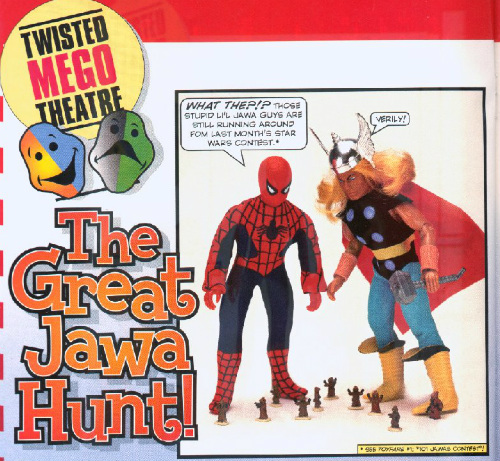 |
| ocities.org |
LYT: Did it make it easier, for example, to pitch to Cartoon Network, because you can say, “Hey, something very similar worked in this format”?
TR: We actually did a 12-episode series of stop-motion that was pretty close to Robot Chicken for a site called Sony Screenblast around the year 2000. So there was existing stop-motion that we could show to Adult Swim and say, “This is what our show would look like.” Mike Lazzo, the president of the network, was like, “I hate the way that looks. I hate stop-motion animation, but your show seems pretty funny, so we’ll give it a shot.”
LYT: When something like this comes along, is it because you guys want to do a DC special, or is it like, “We’ve got this deal with DC – let’s do a special”? How does the process work?
ZW: I think Geoff Johns has been a friend of the show for a while, and he rose through the ranks at DC, and he’s really friendly with all of us. So him and Matt got together and just started bouncing that together. As soon as we heard the idea, I think we all think those DC characters – we have a ball making fun of them.
TR: Never once was it like, “Give us your take on what that show might be, and maybe we’ll consider letting you do a DC special.” It was like, “We’re doing it!” And they were like, “Oh, I guess we’re doing it.”
DG: People at home, so to speak, don’t realize how social this business really is. It literally is. Matthew Senreich, our executive producer, and Geoff Johns, the creative guy at DC, are friends, and as they’re talking, some day it must have just come up. “Hey, it would be cool to do a DC special, right?” And then they look into it, and it happens. A lot of it is not just planned, saying “For business reasons, what is the best property we should do a special on?” No, we’re all just really having fun, even on a business level.
LYT: Has there ever been the idea to do an Indie comics or Image special? Something like the comics that aren’t Marvel or DC?
TR: You said Image and what else?
LYT: Indie, like The Tick or Scud, or any of the things that Shocker Toys would make toys of?
TR: I feel like we are at a level of nerddom that’s already pretty dangerous, as far as a mainstream…
ZW: Esoteric.
TR: ..a mainstream television show goes. So if we went any deeper and said, “We’re going to do half an hour on Spawn,” I don’t know if our viewers would go on that ride with us.
ZW: That’s not to say that we can’t do ten seconds on Spawn during the actual season.
DG: We all have our personal favorites. I’m shocked we’ve never even discussed doing a Star Trek special, but that’s me, and I don’t know if that’s anybody else. Hopefully it is.
TR: Star Trek, to me, is endlessly ripe for making fun of, in ways that I know you don’t always enjoy. [chuckles]
DG: I don’t know what you’re talking about.
TR: I was not a fan of that original series. To me, it’s just ridiculous – the ’60s Star Trek. Doug is like – look at his shirt [It has a picture of the Enterprise and says “Star Wars #1 Fan”].
ZW: Number one fan.
TR: I get it.
DG: You’d be surprised how many people don’t. Well, we would take up all of your time if we started talking about which Star Trek series deserves to be respected.
TR: Only one.
LYT: But you also have Megos of the original, so they’d kind of fit in, stylistically.
TR: Yeah, yeah.
DG: I know!
LYT: It’s a little different for Star Wars. They’re not the same scale.
DG: That’s what makes the series, Robot Chicken, so great. Everyone brings their own nerd baggage to the table that we can enjoy. Or not enjoy, as the case may be.
LYT: Is there ever an issue of scale in something like that, if you want Star Wars characters interacting with Superman?
TR: In the beginning, I would say yes, because if we were going to do a sketch about, say, Micronauts, we would use the actual Micronauts action figures from 1978, and just let the animators deal with them. We’re sophisticated enough now, that occasionally we will use off-the-shelf action figures, just modified a little bit, but for the most part, we will build what we need in a way that is comfortable for the animators to animate.
Those puppets are actually really specific in the way that they have to move and hold their poses, so it’s pretty rare that we would get into a scale issue, where it’s like we can’t have a 12 inch G.I. Joe talking to a 5 inch Masters of the Universe figure. We would just build what we need, I think.
ZW: And any time in the writer’s room that someone brings up a production issue, like, “Oh, that’s funny, but maybe when they animate it, it’s a problem” – we try to kind of pooh-pooh that kind of talk in the writer’s room. Just go for funny, and if it’s a problem later, we’ll work it out.
DG: Yeah.
LYT: Did you ever have an instance where, for example, you wrote a skit with a vinyl-caped Jawa and you couldn’t get a hold of one?
DG: Just season one. We wrote a Batmobile into a Canonball Run parody we were doing, and we wanted the Mego Batmobile, and it was really hard to find and really expensive. And then as soon as we bought it, we destroyed it. But it’s rare that we – the real answer to your question is, if we want a vinyl-caped Jawa, we’ll have our puppet department build one that looks exactly like what we need. We’re not going to buy one for whatever they are – eight grand – just so we can wire them up for animation.
LYT: And then in reverse, did you guys have input in the Mo-Larr action figure?
TR: Well, they certainly asked us if we wanted to do it with them. But they just took our Mo-Larr design and made the toy out of it.
—
Robot Chicken DC Comics Special 2 airs Sunday night at 11:30 p.m. on Cartoon Network.
